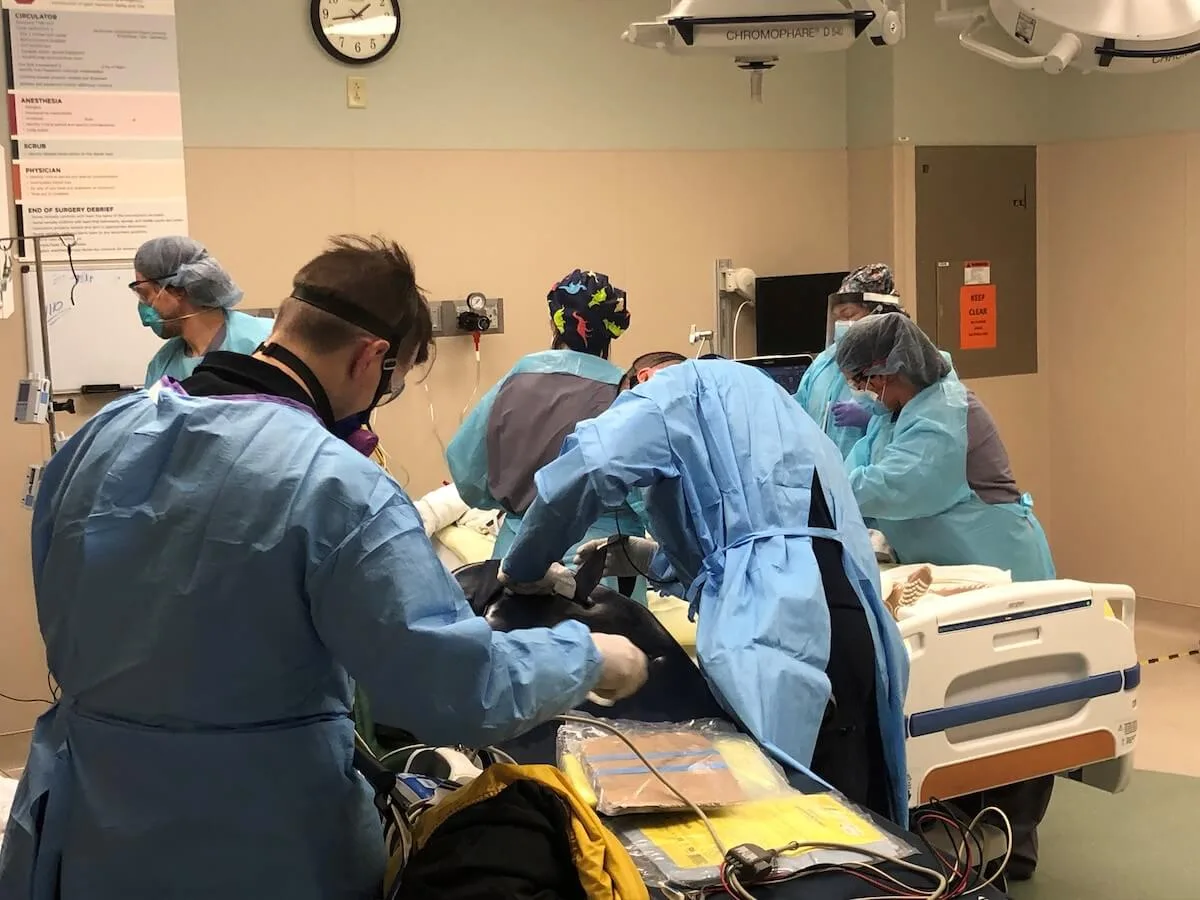
#image_title
#image_title
But relief would still be held hostage unless Evers accepts a big legal favor for businesses that don’t protect workers and customers.
[Editor’s Note: This story has been updated to reflect passage Monday by a Senate committee.]
For the second time in a week, legislative Republicans introduced and held a public hearing on new COVID-19 relief legislation in less than 24 hours.
The Senate Committee on Organization, the small group led by the body’s three top Republicans that normally only meets to set the floor agenda for Senate sessions, gave its two Democratic members very short notice that a public hearing would be held on a rewritten version of the Assembly bill that passed last week.
Sen. Janis Ringhand (D-Evansville) said she found out at 7:45 a.m. about the 11 a.m. meeting.
After suggesting last week that he was not interested in the Assembly’s COVID-19 bill, Senate Republican Leader Devin LeMahieu (R-Oostburg) had originally scheduled a Monday meeting of the Senate Finance Committee to consider a measure that would not be as anti-safeguard as Assembly Bill 1, but one that still attaches aid to a major legal loophole for business. He later switched the bill to the Committee on Organization where it passed.
A draft of the proposed Senate substitute not include several of the “poison pills” in the Assembly’s version, such as requiring a two-thirds vote for school districts to go virtual and a vote every 14 days to replace it, severe limits on public health officials, and oversight of federal COVID-19 funds by the Joint Finance Committee.
Those provisions prompted multiple health organizations, including the Wisconsin Public Health Association, the Wisconsin Association of Local Health Departments and Boards, and SEIU Healthcare Wisconsin to register in opposition to the original Assembly proposal.
But Evers and Democratic lawmakers are less likely to support liability protections for businesses, school districts and other entities from COVID-19 related lawsuits as a tradeoff for other relief portions of the new bill.
LeMahieu said on WISN-TV’s “Upfront” on Sunday that he wanted to pass legislation closer to what Gov. Tony the Evers proposed, but with that “one key provision” added for businesses.
“We think that’s vitally important to the State of Wisconsin,” LeMahieu said. “The reason that one provision is so important is it protects nonprofits, churches, businesses, employers all around the state, all entities from frivolous lawsuits.”
Wisconsin Association for Justice President Jay Urban said his organization has been reaching out to business organizations to ask if any lawsuits have come forward in Wisconsin. So far, they have seen no evidence that a civil case over COVID-19 exposure has been filed, in part because it is so difficult to prove liability already.
Before the Assembly voted on its bill, Speaker Robin Vos (R-Rochester) said the liability loophole was needed, “to ensure that we do not have frivolous lawsuits filed as a get-rich-quick scheme for somebody hoping to profit off of an incredibly bad situation.”
However, legal experts testified before the Assembly’s Health Committee that Wisconsin already places a high burden of proof on such lawsuits, and the provision would protect bad actors.
Attorney Heath Straka, legislative liaison for the Wisconsin Association for Justice, a trial attorneys association, said the immunity provision as laid out in the bill would protect irresponsible and negligent businesses while denying employees and clients the right to trial.
LeMahieu said he has been in contact with Evers’ office and hopes that they are close to coming to an agreement on the liability provision.
Evers told reporters last week that “the likelihood of a veto is very strong” with the Assembly’s original bill which ties relief to several other poison pill provisions such as restrictions on local health officials’ ability to close unsafe businesses, severe restrictions on local schools to conduct classes virtually during a coronavirus flare-up, and wresting control of federal relief funds from Evers and to the Republican-led Legislature.
While LeMahieu said the Assembly’s bill, “is a good bill,” his goal for the Senate’s version is for it to ultimately pass and not be vetoed by Evers. LeMahieu said that 18 of the 27 provisions in the Senate’s version were also in the COVID-19 relief bill Evers signed in April of last year.
“What we’re looking to do in the Senate is to find a bill—and this was our goal all along—is to find a bill that we’re confident the governor can sign so we can get that bill signed for the State of Wisconsin,” LeMahieu said.
LeMahieu hopes the amended bill will get a vote on the Senate floor on Tuesday prior to that evening’s virtual State of the State speech from Evers.
Comparing Each Relief Plan
Evers, LeMahieu, and Vos started meeting in late November to work out a COVID-19 relief bill, after the Legislature had refused for seven months to meet. After weeks of saying they were making progress, those discussions stopped, with the parties blaming one another for the breakdown.
In December, Evers introduced what he described as a compromise bill he felt would be palatable to both parties, based on those November talks. Provisions in the Evers bill include:
- Extending the March 13 deadline requiring health insurance plans to cover COVID-19 testing to June 30.
- Requiring technical colleges and University of Wisconsin institutions to offer students course credit for volunteering or working for at least one semester in eligible pandemic response activities.
- Requiring the Department of Workforce Development (DWD) to publish a plan to address the backlog of unemployment insurance and extending the hours of the unemployment insurance call center to 12 hours per day, seven days per week until claims numbers are sharply reduced.
- Using Medicaid funds to reimburse hospitals forced to provide patient care in an outpatient, clinic setting due to overcrowding from coronavirus patients, and to hospitals caring for patients who have to remain in their care because no nursing home beds are available.
The governor had hoped the Legislature would take up the bill in December, but Republican leadership never reconvened a legislative session after meeting in mid-April..
On Jan. 4, the first day of a new legislative session, Evers sent a letter asking they hold a hearing on his bill. Assembly Democrats introduced their own version, which was the Evers bill plus provisions from their Healthcare Heroes Act. It did not gain any traction in the last session.
The Healthcare Heroes Act included:
- Hazard pay and paid sick leave for healthcare workers.
- State-funded COVID-19 testing and treatment for healthcare workers who are uninsured.
- Expanding healthcare workers’ health insurance coverage to include COVID-19 testing and care.
- Accepting the Medicaid expansion, a feature of the Affordable Care Act that has been rejected by Republicans despite costing the state more than $1 billion in lost federal funds.
Instead, Vos decided to fast-track a bill by Assembly Republicans. It included some of the relief provisions in the Evers and Assembly Democratic bills, but also included several provisions that Evers said he could not support, including:
- Liability protections for entities from COVID-19 lawsuits.
- Limitations on the powers of public health departments related to business closures.
- Requiring two-thirds of school board members to vote in favor of virtual learning to implement it and then only for 14 days at a time.
- Authorizing Joint Finance Committee to oversee the spending of federal COVID-19 funds.
- Barring employers and public health offices from requiring vaccination.
Despite objections from health officials and legal experts, the Assembly proposal passed last week on a party-line vote.
Politics

Biden makes 4 million more workers eligible for overtime pay
The Biden administration announced a new rule Tuesday to expand overtime pay for around 4 million lower-paid salaried employees nationwide. The...

Biden administration bans noncompete clauses for workers
The Federal Trade Commission (FTC) voted on Tuesday to ban noncompete agreements—those pesky clauses that employers often force their workers to...
Local News

Readers Poll: Top Bowling Alleys in Wisconsin
Looking for the best bowling in Wisconsin? Look no further! Our readers have spoken in our recent poll, and we have the inside scoop on the top...

8 Wisconsin restaurants Top Chef judges are raving about
Top Chef’s 21st season is all about Wisconsin, and on-screen, it’s already apparent that the judges feel right at home here. But, while filming in...



